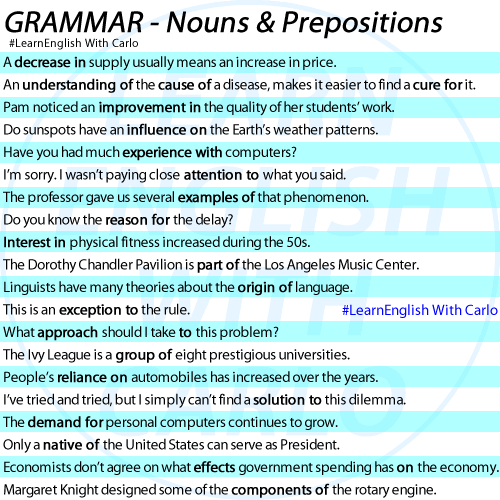Certain nouns are often accompanied by specific prepositions, creating noun-preposition collocations. For instance, when we use the noun “interest,” it is typically followed by the preposition “in.” Similarly, “contact” pairs with “with,” and “room” with “for.” For example:
- “I have no interest in what you are saying.”
- “I will be in contact with you soon.”
- “We don’t have room for the sofa.”
Recognizing which preposition to use in these collocations can be challenging. One helpful strategy is to consider related adjectives or verbs. If we know the preposition commonly used with an adjective or verb, we can apply the same preposition to the related noun. For example:
- Adjective: “Tom had a successful career in movies.”
- Verb: “He succeeded in making good movies.”
- Noun: “I wished him success in his new movie.”
However, this rule doesn’t always apply universally, and the best way to internalize these combinations is through practice and exposure to English materials. Regular reading and listening will help you become familiar with what sounds natural over time.
Here are some more example:
- A decrease in supply usually means an increase in price.
- An understanding of the cause of a disease, makes it easier to find a cure for it.
- Pam noticed an improvement in the quality of her students’ work.
- Do sunspots have an influence on the Earth’s weather patterns.
- Have you had much experience with computers?
- I’m sorry. I wasn’t paying close attention to what you said.
- The professor gave us several examples of that phenomenon.
- Do you know the reason for the delay?
- Interest in physical fitness increased in the 50s.
- The Dorothy Chandler Pavilion is part of the Los Angeles Music Center.
- Linguists have many theories about the origin of language.
- This is an exception to the rule.
- The Ivy League is a group of eight prestigious universities.
- People’s reliance on automobiles has increased over the years.
- I’ve tried and tried, but I simply can’t find a solution to this dilemma.
- The demand for personal computers continues to grow.
- Only a native of the United States can serve as President.
- Economists don’t agree on what effects government spending has on the economy.
- Margaret Knight designed some of the components of the rotary engine.

